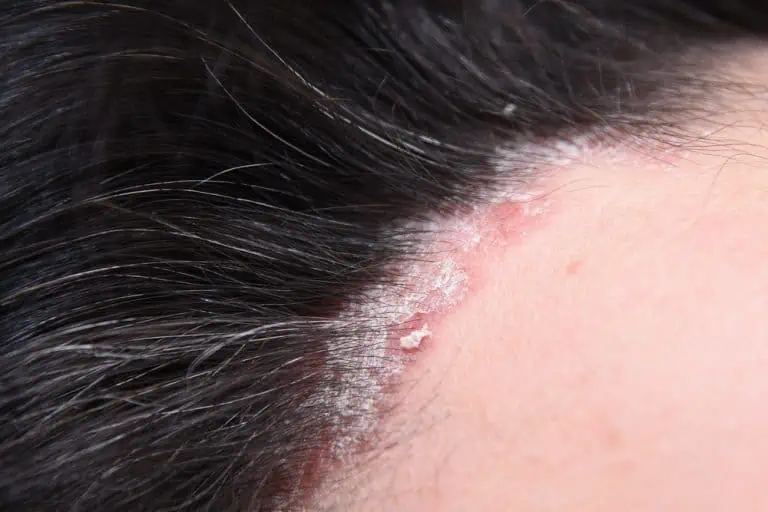Scalp Psoriasis Treatment: What Works?

Scalp psoriasis can be so mild you don’t even realize you have it — or it can be impossible to ignore, causing patches of thick and inflamed skin, silvery white scales and a scalp so dry it may crack and bleed. The condition can be embarrassing to live with, and it may be physically painful, too, due to intense itching, burning and soreness.
If you’re one of the 45% to 56% of people with plaque psoriasis who have scalp psoriasis, rest assured that there’s no shortage of treatments available. That said, treating psoriasis of the scalp may take some trial and error, so be patient.
“Scalp psoriasis often proves to be rather stubborn,” said Stephanie Simmerman, APRN, an Advanced Practice Registered Nurse with Riverchase Dermatology.
The scalp psoriasis treatment that works best for you will depend on the severity of your condition and what your skin responds to.
What is scalp psoriasis?
Scalp psoriasis is an inflammatory skin condition in which the immune system causes skin cells to grow too fast — in days instead of weeks. The cells pile up on top of each other, creating thick red patches and skin flakes with a silvery-white sheen. In addition to the scalp, the condition can affect the back of the neck, the forehead and behind the ears.
What causes scalp psoriasis?
The exact cause is unknown, but genes play a role. A variety of triggers can lead to a first episode or a flare-up, including severe stress, cuts and burns, cold and dry weather, tobacco use, heavy drinking, infections such as strep throat and taking medications such as lithium and prednisone.
Scalp psoriasis can be a sign of psoriatic arthritis, a form of arthritis that causes joint inflammation. Skin and joint symptoms can develop at the same time, but most people with psoriatic arthritis develop skin symptoms first.
Scalp psoriasis treatment
There’s no cure for scalp psoriasis, but treatment can reduce the scale and slow the growth of new skin cells.
“The treatment options for psoriasis have exploded over the last few years,” said Simmerman. “Numerous new topicals and systemic medications have come to market with incredible efficacy, safety and prescription drug coverage. While a cure for psoriasis has not been discovered, we have a full tool chest of treatment options.”
At Riverchase Dermatology, treatment often follows a certain pattern. “Each case is unique, but many patients prefer to start with a topical steroid,” said Simmerman. “Usually these are applied to the plaques twice a day for two weeks. If treatment failure presents or a patient has a more severe case, an oral medication or injected biologic may be more appropriate. We also use in-office phototherapy, which is UV light. The light is used to slow skin cell growth and calm inflammation.”
Here’s a closer look at the most common approaches to treating scalp psoriasis. In some cases, your dermatologist may recommend more than one type of treatment. You may be advised to switch treatments after a while to avoid side effects.
Shampoos
What is the best shampoo for psoriasis of the scalp? Coal tar shampoo and salicylic acid shampoo are go-to treatments. Coal tar slows the growth of skin cells, which helps alleviate symptoms such as scaling and itching. You can find coal tar shampoos, such as Neutrogena T/Gel Therapeutic Shampoo, at your local pharmacy.
Salicylic acid shampoo helps soften and dislodge scales. It can be drying and irritating, so ask your dermatologist if it’s right for you. You can buy a salicylic acid shampoo at the drugstore, but a stronger prescription version is often what does the trick.
Topical corticosteroids
Topical corticosteroids are available in a range of potencies and come in foams, solutions, ointments and other forms. They slow the growth rate of skin cells and help relieve redness, scaling and itching.
Long-term use of corticosteroids can cause side effects, such as thinning of the skin, so they’re used for only two to 12 weeks at a time, depending on the severity of your scalp psoriasis and other factors. If you have a mild to moderate case, a topical corticosteroid may be the only treatment you need. But even people with severe psoriasis can benefit from these medications when they’re used together with other treatments.
Intralesional corticosteroids
If you have very thick psoriasis lesions on your scalp, your doctor may recommend intralesional corticosteroids, which are injected into the lesions with a very fine needle.
Topical vitamin D analogues
While not as effective as the most potent topical corticosteroids, these medications, which include calcipotriene and calcitriol, can help with mild to moderate psoriasis. They work by binding to vitamin D receptors, and they slow skin cell production, flatten lesions and remove scale.
Calcipotriene is available in various forms, including creams and foams, but calciferol is available only as an ointment. Treatment with vitamin D analogues lasts for four to eight weeks.
For maximum effect, your dermatologist may prescribe a topical medicine that includes a vitamin D analogue and a corticosteroid.
Topical and oral retinoids
Retinoids, which are derivatives of vitamin A, aren’t just for wrinkles. The topical retinoid tazarotene is helpful for mild to moderate scalp psoriasis. Like other drugs, it slows the overproduction of skin cells. Tazarotene is available as a cream, lotion, foam and gel. Because it can be irritating, it’s often prescribed along with a corticosteroid.
If you have severe scalp psoriasis, your dermatologist may recommend taking an oral retinoid called acitretin to slow cell growth and reduce inflammation. It can be used in combination with other treatments, including phototherapy.
Phototherapy (light therapy)
Various types of phototherapy, particularly narrow band UVB light therapy, have been shown to be effective against scalp psoriasis. Some are delivered by excimer laser.
Phototherapy controls the condition in several ways, including by suppressing the immune system, slowing cell growth and reducing inflammation. The treatments are administered two to five times a week, usually at a psoriasis treatment center or hospital, and are given for anywhere from weeks to months to years. You may be advised to avoid using salicylic acid shampoo beforehand.
If phototherapy works for you, your dermatologist might prescribe a light box or handheld device you use at home to maintain the benefits.
Apremilast
Apremilast (Otezla) is a twice-a-day pill for moderate to severe scalp psoriasis that reduces redness, scale and plaque thickness. It also reduces itching in some people. The drug is thought to work by reducing the body’s production of inflammatory molecules. In a clinical trial, 43% of patients were clear or almost clear by week 16.
Methotrexate
Intended for severe psoriasis, this strong medication, usually taken in pill form, may be prescribed if you haven’t seen improvement with topical medications or phototherapy. It works by suppressing parts of the immune system.
Cyclosporine
Like methotrexate, cyclosporine is recommended for severe, disabling psoriasis and may be prescribed if other treatments have failed. It’s available as a pill and a liquid. Also like methotrexate, it works by suppressing parts of the immune system. Cyclosporine is very potent and can lead to serious side effects, so it’s not used as a long-term scalp psoriasis treatment.
Biologics
Instead of being synthesized from chemicals, biologics are grown, often with the help of living cells. Many different biologics are FDA approved to treat moderate to severe psoriasis.
Biologics target specific cells and proteins that cause psoriasis and its symptoms, and they often have fewer side effects than drugs that suppress more of the immune system. They can be very effective in patients who haven’t gotten good results from other treatments. These drugs are given intravenously or via injection, some with as few as four doses a year.
For people who also have psoriatic arthritis, biologics can help prevent joint damage or slow the rate of the damage.
Off-label medications
If you have severe scalp psoriasis that hasn’t improved with FDA-approved psoriasis medications, your doctor may prescribe other medications off-label. These include azathioprine, sulfasalazine and tacrolimus, all of which work by suppressing the immune system and are normally used to treat rheumatoid arthritis and/or prevent organ rejection. Another is fumaric acid esters (FAE), which may also suppress the immune system.
Treating scalp psoriasis isn’t one-size-fits all. Working with a dermatologist is the best way to find treatments that help you look better, feel better and restore your confidence.
At Riverchase Dermatology, “Our goal is to help you feel empowered and in control of your chronic inflammatory skin condition,” said Simmerman.
Medical reviewed by Stephanie Simmerman, APRN
Written by Jessica Brown, a health and science writer/editor based in Nanuet, New York. She has written for Water’s Edge Dermatology, Prevention magazine, jnj.com, BCRF.org, and many other outlets.


